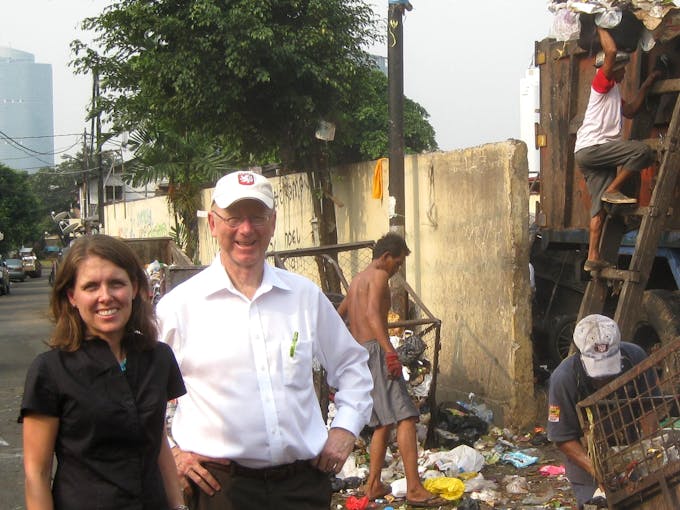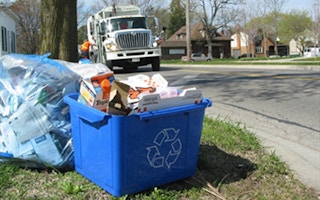Derek Stephenson, director of Global Solutions for the Reclay Group, has spent more than 30 years developing recycling programmes. So it comes as a surprise when he says that he initially had “no experience and very little interest in recycling”. Despite this, he helped start the first city-wide residential recycling programme in Ontario, Canada, in the 1970s when he was hired as the research director of the non-profit, Is Five Foundation, by its founder Jack McGinnis.
To continue reading, subscribe to Eco‑Business.
There's something for everyone. We offer a range of subscription plans.
- Access our stories and receive our Insights Weekly newsletter with the free EB Member plan.
- Unlock unlimited access to our content and archive with EB Circle.
- Publish your content with EB Premium.
Back then, Stephenson was more interested in environmental projects that were already underway, like energy conservation, community shared services and equipment, organic gardening, hazardous waste reduction, public transit and community education. But he had a change of heart because, he recalls, “It quickly became clear that many citizens were eager to become active participants in practical activities to protect the environment. Separating recyclables from household waste was embraced as a contribution that everyone could make every single day.”
What resulted was the first formal curbside recycling programme, which started in 1974, serving 80,000 households. A few years later, Stephenson and McGinnis started Resource Integration Systems Ltd (RIS), a recycling and waste management consulting business that funded their environmental advocacy programmes. In 1981, they invented the now-iconic “Blue Box” with the words, We Recycle, stamped on its side.
From the 1980s, RIS established offices across North America and in Europe, providing technical, strategic and design support in developing state-wide and industry-led recycling programmes. Stephenson became the senior vice president of Corporations Supporting Recycling (CSR) in 1996, working to broaden industry support for recycling by developing stronger markets for recovered materials, promoting wider citizen participation, and advocating for a level playing field.
Together with the senior staff of CSR, Stephenson formed StewardEdge Inc in 2009 to develop comprehensive product stewardship programmes and legislation for waste electrical and electronic equipment, printed paper and packaging, and municipal hazardous and special wastes. His sound technical knowledge, understanding of new developments and expert negotiating skills have allowed him to reconcile the differing interests of governmental, industrial and public groups. StewardEdge joined the Reclay group in in 2012 and Stephenson remained its president till end of last year.
“
Recycling cannot be treated as a service for the motivated few, or a token add-on to a community’s waste management system. Material recovery and recycling is becoming the essential enabler of the emerging circular economy
Stephenson will speak at the Clean Environment Convention (Waste Management track), as part of the CleanEnviro Summit Singapore 2014, on June 3 and 4 at Marina Bay Sands, Singapore
What was it like to pioneer the first household source-separation recycling programme in Canada?
After working on various pilot-scale recycling projects, we mustered the courage, resources and many volunteers to launch the first city-wide, multi-material collection program in Canada, covering more than 100,000 people. We had enough money to distribute promotional flyers to all the households, rent collection trucks and pay our workers for the first week. If people had not participated, we would have had to shut the programme down very quickly. But they did participate - by the tens of thousands - and there was so much material to collect that the collection crews were overwhelmed.
What important lessons did you learn about recycling and human behaviour while establishing Canada’s first municipal recycling programme, and can these lessons be applied in Asia?
First and foremost, I learnt that the overwhelming majority of people will support recycling if you make it convenient and practical for them to do so. My own rule of thumb is that:
- 10 per cent of a population will go to a great deal of trouble to sort and carry their recyclables to a drop-off centre, even if it means an extra trip.
- 10 per cent of a population will not participate in recycling unless they are given a direct financial incentive or are legally required to do so.
- The remaining 80 per cent are open to persuasion if the recycling service is convenient, practical and supported by effective promotion and education.
I believe that some variation of this rule is applicable in many Asian countries.
Second, I learnt that we need to make recycling as easy as – in fact, easier than – waste collection and disposal. As an example, in the most advanced waste management systems in North America, recyclables are collected in dedicated containers, often with recyclables mixed together, on a weekly basis, at no charge to the resident; waste is collected every other week and residents pay for collection per bag or per bin. Increasingly, recyclable materials are banned from landfills.
Recycling cannot be treated as a service for the motivated few, or a token add-on to a community’s waste management system. Material recovery and recycling is becoming the essential enabler of the emerging circular economy. Countries and companies which cannot reduce waste and recover value from used products, packaging, materials and organics will increasingly be at a competitive disadvantage, and be seen by their citizens and their customers as contributing to environmental problems rather than solutions.
Lastly and, perhaps, most importantly, recycling cannot be thought of as an “end-of-pipe” solution. The old “make-use-dispose” paradigm is transitioning to circular economy thinking. (A circular economy uses as few resources as possible, maximises the value of the resources for as long as possible, and recovers products and materials at the end of their service life.)
Globally, the manufacturers and retailers of an ever-increasing range of products, from electronics to pharmaceuticals and coffee capsules to pesticides, are choosing, or are being forced, to design out waste and to recover used products while internalizing these costs into the price of these products.
“
High-rise residential apartments have proven to be the most difficult nut to crack for residential recycling programs. While the single common waste chute/single waste bin is the greatest impediment, perhaps equally important is the anonymity factor
How can household recycling programmes be successfully implemented in high-rise residential apartments such as in Singapore, where rubbish is thrown down a common chute and collected on the ground level in a bin?
High-rise residential apartments have proven to be the most difficult nut to crack for residential recycling programs. While the single common waste chute/single waste bin is the greatest impediment, perhaps equally important is the anonymity factor. The peer pressure created by highly-visible household recycling containers lining a community’s streets, often emblazoned with “We Recycle”, is largely absent in high rise buildings.
Including recycling chutes in the design of new buildings has proven successful in some communities. Providing storage containers or recycling bags for apartments has helped. Placing well-designed recycling centres in high-density communities is common in Germany and other European countries. Placing recycling bins next to every waste chute, collected by building maintenance staff, works well in my 15-storey apartment building in Toronto.

Derek Stephenson, director of Global Solutions for the Reclay Group (right), on a working visit to Jakarta, with April Crow, global sustainability director for packaging at The Coca-Cola Company.
Communities in London, England have tried collecting recyclables door-to-door. Waste-pickers in Bogota, Columbia, work with building maintenance staff to sort and collect recyclables. Waste-collection companies in Shanghai sort recyclables from mixed-waste bins on site before cleaning up and moving on to the next building. As national recycling targets have increased in many countries we are seeing greater attention to this sector, and I am confident that we will see greater innovation in this area.
What recurring conflicts have you encountered in the course of facilitating the development of extended producer responsibility (EPR) programmes and legislation? How do you help stakeholders move pass such stalemates?
Increasingly, I see my role almost as a grief counsellor as obligated companies go through the classic Kübler-Ross model, or the five stages of grief:
Denial: My product/package is just a tiny portion of the overall waste stream and it makes no sense to include this in an EPR program.
Anger: I will stop selling my products in your country if you pass this EPR law.
Bargaining: For very low recovery targets, longer times to reach targets and sharing costs along the supply chain.
Depression: This is so complicated. Why doesn’t the government just tax every business and consumer to pay for recycling?
Acceptance: How can I meet the targets at the lowest possible cost, and how can I gain a competitive advantage for my company?
To deal with these recurring conflicts, it is important to demonstrate an in-depth understanding of international experience with EPR (both the good and the bad) and the ability to adapt these experiences to local conditions. No two EPR programmes are exactly alike. You cannot simply “copy and paste” policy or legislation from another country.
How can more companies in Asia be persuaded to integrate the cost of packaging recycling into the advertised prices of their products? How necessary is legislation for this to happen?
EPR is simply one manifestation of the global transition underway to “internalise externalities”, whether these are related to waste, water, CO2, fair trade or acceptable employment conditions. Two types of companies in Asia will lead the transition in this region:
Leading multinational companies that recognise the strategic threat to their businesses from growing resource constraints, understand they require a “social license to operate” in these countries, and already have direct experience with EPR policies and legislation in Asia, Europe and the Americas. More than 50 countries in the world have implemented EPR legislation and many more are moving in that direction. Leading domestic companies that want to get ahead of the curve to maintain their competitive advantage while adjusting to new market conditions.
In my experience, product stewardship policies, which I consider a more encompassing term than the narrower EPR concept, often begin as voluntary, industry-led or industry/government partnership programmes. However, experience has shown that companies which embrace these programmes often end up advocating for “level-playing field legislation” to require all competing companies to participate, or if recycling targets set by government are challenging.
How do international events, like the CleanEnviro Summit Singapore (CESS), help countries and industries move beyond ideas to implementing change on the ground?
There is no substitute for direct dialogue among key stakeholders to ensure clear understanding of experience elsewhere and the reality of local conditions. The CESS, in particular, brings together both practitioners and key decision makers. This provides an excellent opportunity to share key lessons learned in open forums, and to identify potential partners for developing and implementing practical solutions suited to their communities. I look forward to an engaging dialogue among experienced practitioners with widely different world views so that delegates will be exposed to a broad range of ideas that may be applicable in their own communities. Singapore has so often served as beacon community in the region and I hope it will also become a leader in this arena as well.





















